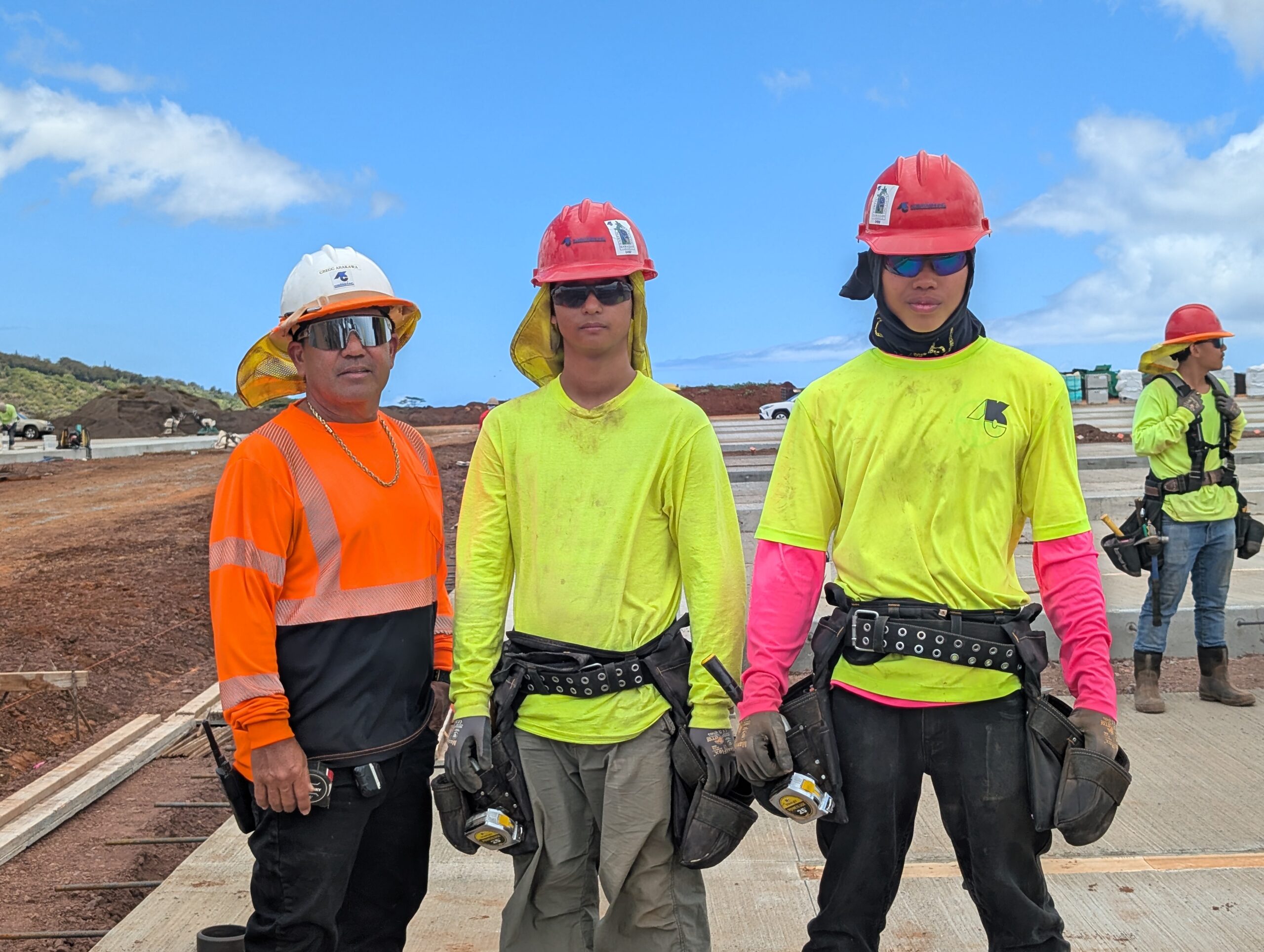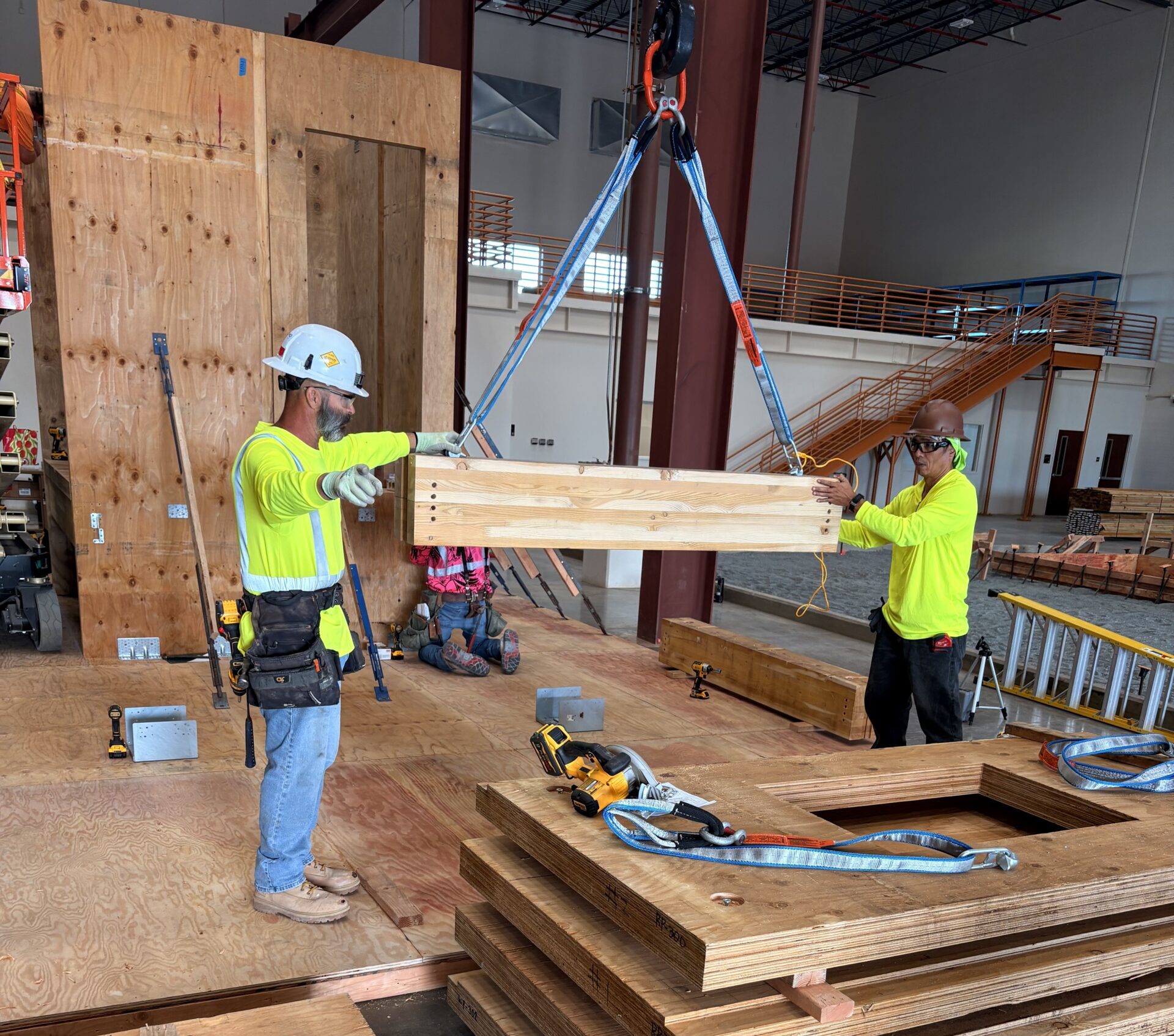Female Carpenters Enjoy Good Pay and Mentoring
By Dan Nakaso
Read the original article featured in The Star Advertiser at http://tinyurl.com/star-ad-sib
Coming up in Hawaii’s construction industry as apprentices, drywaller Trisha Taketa and carpenter Vaneza Austria were usually the only women on their job sites where they received side glances from older, male construction workers.
Now as journey-level workers, they’re mentoring the next generation of Hawaii’s female construction apprentices and have earned acceptance as part of the Hawaii Carpenters’ Union’s “Sisters in the Brotherhood” program that also works to keep female journey-level laborers in the industry.
Taketa and Austria started in different careers before switching to construction.
Taketa, 38, grew up in Kaneohe and took classes at Honolulu Community College, Kapiolani Community College, and Windward Community College before becoming a grocery store manager.
Then in 2012, Taketa became an apprentice drywaller “because this is more fun,” she said. “Your co- workers are very colorful. There’s so many different personalities that you work with. It’s not a boring desk job. Every day is different.”
Austria, 40, grew up in Kailua, attended all of the University of Hawaii’s Oahu community colleges, but did not graduate from UH and later attended Heald Business College before joining the hospitality and visitor industry.
Austria switched to construction in 2016.
“When I first started, it was just me,” she said. “Now I have two other women on job sites” while mentoring three female apprentices.
Apprentices earn $21.80 an hour with free, no-debt education before rising to journey-level pay of $53 an hour for carpenters like Austria and $53.25 an hour for drywallers like Taketa — with no monthly health care premiums and a 401(k) retirement program.
Plus each hour worked earns them $5.25 toward a “vacation and holiday fund” — typically $5,000 every six months that they can pocket or use to subsidize any time they take off.
“During down times, I go to ‘Vegas,” Taketa said, then caught herself and laughed, “OK, Disneyland.”
Her income enabled Taketa to buy a three-bedroom, two-and-a-half bath house in Mililani and a luxury Genesis SUV “that I love,” she said.
“I wouldn’t be able to afford my house, my car if I was still a manager at my supermarket,” Taketa said. “It was like night and day.”
Because of the skills she learned for free and on the job, Taketa was proud to be able to renovate her house on her own, except for plumbing and electrical work.
Austria, who mostly works on high-rises, points out job sites to her daughter and three sons and tells them, “That’s where mommy worked. That was me. I show off all the time.”
Taketa has a 22-year-old son who wants to join the construction industry and is figuring out where he wants to specialize.
Taketa mentors four younger, female construction workers, just finished teaching at the Hawaii Carpenters and Drywall Training Fund Center in Kapolei and is working with the Waiawa Correctional Facility on a six-week, pre-apprenticeship program with hopes to do similar training at the Women’s Community Correctional Center.
State Rep. Trish La Chica, (D, Waipio-Mililani), will serve as vice chair of the House Education Committee this legislative session.
La Chica plans to introduce a bill to expand similar, pre-apprentice training programs in Hawaii high schools to help create more housing and “because Hawaii’s future and the ability for our youth to remain in Hawaii relies on an educated and skilled workforce. We’re going to need thousands of more jobs and we want them to be local jobs.”
She wants to retrofit more Hawaii high schools to provide on-site, hands-on training while partnering students with the construction industry to provide paid internships.
“We want to invest in their future by being able to start a life and career here with as little debt as possible,” La Chica said.

Photo courtesy of Cindy Ellen Russell / CRUSSELL@STARADVERTISER.COM
Journey-level construction workers Trisha Taketa, left, and Vaneza Austria are part of the Hawaii Carpenters’ Union’s “Sisters in the Brotherhood” program that works to keep female journey-level laborers in the industry. The pair is seen in front of a mural in the foyer of the Hawaii Regional Council of Carpenters headquarters in Kalihi.
Out of the carpenters’ union’s 6,000 members, only 83 are women — 31 journey- level workers and 52 apprentices, including one female apprentice in her early 50s.
On the mainland and Canada, there are a half-million carpenters, including only 14,240 women — 9,305 at the journey level and 4,254 apprentices, according to the Carpenters’ Union.
The goal of the “Sisters in the Brotherhood” program, for now, is to retain the female construction workers the union already has before focusing on recruiting more women, said Ron Taketa, executive secretary-treasurer of the Hawaii Regional Council of Carpenters, who is unrelated to Trisha Taketa.
Ron Taketa acknowledged that the male-dominated construction industry has been slow to embrace women and needs to catch up — especially with an aging workforce and on-going demand for both more workers and more housing.
In January 2023, Hawaii was tied with the eighth oldest construction workforce with a median age of 46, according to the National Association of Home Builders.
Taketa called the work “an excellent opportunity for women who want to earn a living wage, with great benefits and without college debt. We want more women and we need to do a better job of keeping those we recruit.”
The carpenters’ union sent Austria and Tricia Taketa to separate national “Sisters in the Brotherhood” conventions in Las Vegas, where they were surrounded by 2,000 other women in construction.
“It was packed with women from everywhere,” Tricia Taketa said. “You could be relatable or you could speak freely or hear how other females made it in the trade. … Inspirational would be a good word to call it.”
During Austria’s convention, “it was nice to see other women because there’s not that many women here,” she said. “It was an eye opener. It makes you feel like you can do this. You’re not alone.”
Since March, the carpenters’ union has organized monthly meetings at its union hall on Houghtailing Street, including a Zoom link for women on the neighbor islands.
Each meeting features a different speaker who focuses on various aspects of the construction industry, but some are specific about mentoring and communicating with younger women.
Next month, they’ll talk about diversity in the workforce and issues specific to female construction workers.
For younger women considering a career in construction, Austria said, “They should give it a try. Take a chance on yourself.”
Trisha Taketa said, “Women should just go for it. If men can do it, women can, too. Challenge accepted.”


